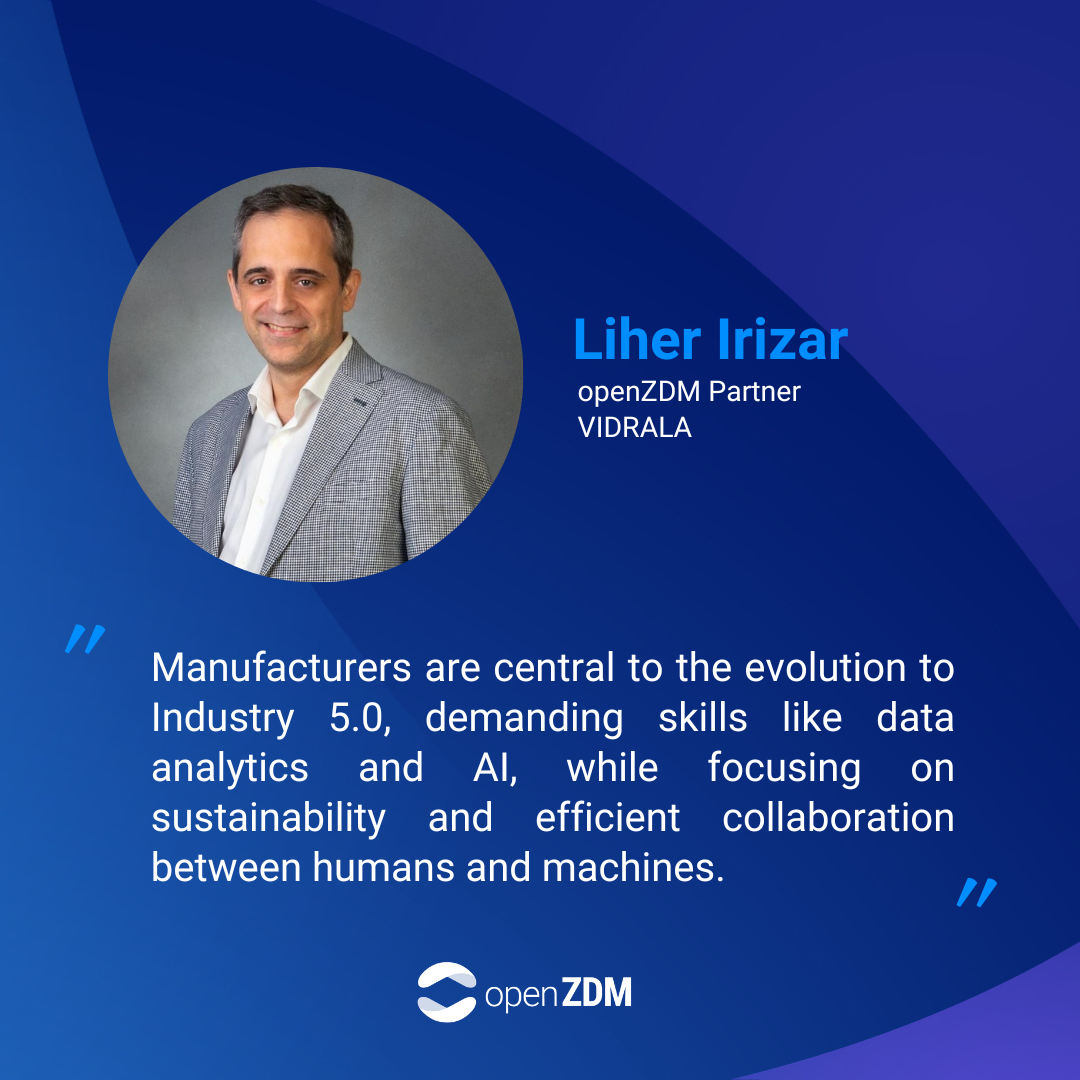Insights from Vidrala: Exploring the future and sustainability in Manufacturing

It was our pleasure to discuss on the Future of Manufacturing & Sustainability with Liher Irizar González, Director of R&D at Vidrala, openZDM partner. Here is what we found out.
1. With emerging technologies like artificial intelligence, smart manufacturing, lean manufacturing, robotics, augmented reality, among others. How can today’s engineers adapt to stay at the forefront of innovation?
In the context of emerging technologies and sustainability in manufacturing, there are several strategies that can be applied to stay at the forefront of innovation. I would remark the following as some of the most relevant:
- Continuous (lifelong) learning, in order to stay updated on the latest technologies and trends.
- Agile mindset, allowing capabilities to adapt to changing technologies and sustainability requirements.
- Develop a strong professional network. Attending industry conferences, joining sustainability organizations, tech. centers… and engage with peers and mentors to exchange ideas and stay informed.
- Consider working/collaborating with start-ups.
- Cross-disciplinary skills are also key due to the high specialization levels required within the different technologies. It could help working effectively with professionals/experts from various backgrounds and technology fields.
- In the same way, developing soft-skills (communication, problem-solving…) will be essential.
- Get familiar with digital tools and data analytics. These capabilities are essential for making data-driven decisions within all the aspects of the manufacturing processes.
2. What are the challenges and opportunities you see in achieving sustainable manufacturing practices, and how can manufacturers balance sustainability with economic considerations?
I will try to be very direct and clear on this matter.
Challenges:
- Investment costs.
- Operational changes that may disrupt current operations.
- Regulatory compliance.
Opportunities:
- Sustainable practices can lead us to long-term cost savings.
- Market differentiation by attracting eco-conscious consumers.
- Reduce exposure to regulatory and reputational risks.
Balancing sustainability with economic considerations requires:
- Strategic planning.
- Innovation.
- Commitment to continuous improvement.
3. What potential challenges do you foresee in the widespread adoption of Industry 4.0 technologies, and how can they be mitigated?
The widespread adoption of Industry 4.0 technologies faces several challenges. The initial investment required for implementing IoT devices, automation systems, and digitalization can be a barrier. Data security is a critical concern due to increased connectivity, and there is a shortage of skilled professionals to design and maintain these solutions.
Besides, integrating new technologies with existing systems and managing organizational change can be complex.
Probably, in order to mitigate these challenges as much as possible, the following aspects could help:
- A gradual approach. Starting with pilot projects and scaled implementations in order to spread costs and gather valuable insights.
- Modular and scalable technologies.
- Robust cybersecurity architectures and solutions.
- Collaboration with industry peers, technological partners and government support can also facilitate the adoption of Industry 4.0, making it more accessible.
4. What role do the manufacturers play in facilitating the transition from Industry 4.0 to Industry 5.0, and what skills are crucial in this context?
Manufacturers are central to the evolution to Industry 5.0, demanding skills like data analytics and AI, while focusing on sustainability and efficient collaboration between humans and machines.
- Manufacturers play a vital role in transitioning from Industry 4.0 to Industry 5.0 by investing in emerging technologies, emphasizing human-machine collaboration, and optimizing data management.
- Manufacturers must integrate sustainability practices and environmentally friendly processes.
- Adapting to Industry 5.0’s interdisciplinary and sustainable demands is essential to remain competitive and innovative.
Short Biography
Liher Irizar González is the Director of R&D at Vidrala. With more than 20 years of experience in the glass industry, he brings a wealth of expertise to his role.
His educational background includes studies at ETSI Bilbao, where he earned a bachelor’s degree in industrial engineering. In addition, he has completed an Executive MBA at ESIC: Business & Marketing School, as well as a master’s degree in Big Data and Business Intelligence.
His extensive career includes various key roles in the industry, such as serving as the Director of Quality at Vidrala, Director of Plant at MD Verre, and Director of Production at Aiala Vidrio.


